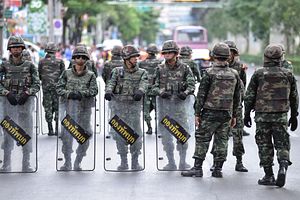In Washington last week to attend the Nuclear Security Summit, Thai Prime Minister Prayuth Chan-ocha tried to reassure foreign policymakers that Thailand was indeed headed back to democracy next year. Three years after Prayuth launched a coup, he promised, in an interview with Voice of America’s Thai service, the generals would hand over power and hold an election.
But events in Thailand suggest that Prayuth and his allies actually are digging in for the long haul. After months of wrangling over a proposed new constitution, the draft revealed by the charter writing committee contains clauses that seem extremely undemocratic. The charter will allow the junta to control the selection of the vast majority of senators who will sit in the upper house of parliament, if the constitution is approved. In addition, the charter gives the unelected upper house, and other unelected government bodies, far more power than they had under the previous constitution. And the proposed constitution also contains a clause that could allow for an unelected prime minister, potentially another avenue for the armed forces to continue wielding power even after an election for the lower house next year. In total, the constitution appears designed to ensure that political parties remain weak, and no one can gain a working majority in the lower house of parliament.
Meanwhile, last week the junta granted soldiers essentially unrestrained police powers. The new order allows Thai officers above the lieutenant rank to arrest and search virtually anyone they want, without having to produce significant evidence that the suspects actually committed a crime. Conveniently, the same soldiers will also be able to interrogate suspects, according to a statement by Deputy Prime Minister Prawit Wongsuwon.
On the ground in Thailand, the junta also is stepping up repression of critics, in advance of a national plebiscite on the constitution to be held in August of this year. The junta apparently will bar any public discussion sessions about the draft constitution, except for those organized by the government. The army has suggested that anyone who offers tough public criticism of the proposed charter could be jailed. Prayuth also recently announced that the army may step up its Orwellian-named “attitude adjustment” sessions for critics—conveniently held at military bases and other unknown sites, and featuring tactics like tossing journalists, politicians, and civil society activists in tiny, bare cells for extended periods of time. The regime’s paranoia has extended so far that, last week, the government arrested a woman in Chiang Mai for posing for photos with a red bowl—a bowl that was inscribed with a Thai New Year message from exiled former prime minister Thaksin Shinawatra. The woman faces a possible term of seven years in jail on charges of sedition.
Even if the junta does hold an election next year, and one of Thailand’s two major political parties wins enough seats to control the lower house, the clauses in the constitution designed to limit politicians’ power, and the threat of another putsch, will limit any prime minister’s authority. The most likely near-term scenario is a return to the semiauthoritarian style of government that ruled Thailand in the 1980s, under former army chief-turned-prime minister Prem Tinsulanonda. Such “Premocracy 2.0,” as Thitinan Pongsudhirak of Chulalongkorn University calls it, might put Thailand under an arrangement in which, as in the 1980s, “elected politicians and political parties could contest polls and divide up [less powerful] ministries” while the armed forces maintain a grip on the most important Cabinet positions, and have behind-the-scenes control, managing the government even though there are regular parliamentary elections, Prof. Thitinan notes.
But Thailand’s population is no longer living in the 1980s. It is politically empowered, used to representative democracy, and much more educated. Despite the junta’s repression, Thai citizens are able to access relatively unfiltered news through social media. And the country’s economy is staggering, not growing at the high rates that Premocracy 1.0 delivered. As Thitinan notes, Prayuth and the other junta leaders do not seem interested in delegating authority over financial and economic policymaking, the way Prem did, to great success; partly as a result, there is little reason to believe Thailand’s economy can even recover to growth rates comparable to other regional peers today, let alone the turbocharged growth of Cold War-era Thailand.
Joshua Kurlantzick is a fellow for Southeast Asia at the Council on Foreign Relations. This post appears courtesy of CFR.org.

































